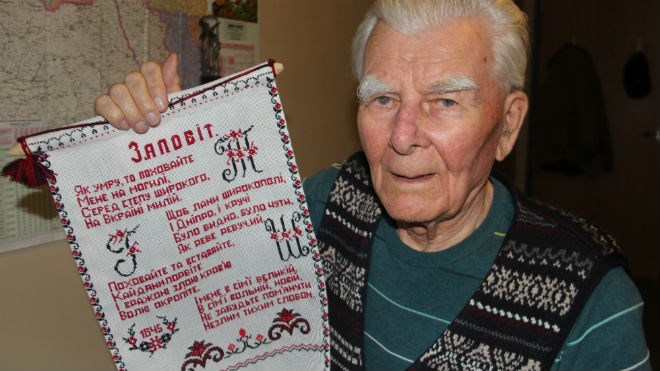Editor's note: Mykola Wargaty had some incredible stories of survival to tell.
The Sudbury resident passed away May 28 at the age of 92. His funeral is June 3 at 10 a.m. at St. Mary's Ukrainian Church.
Last November, in honour of Remembrance Day, NorthernLife.ca brought you Wargaty's story about the years he spent as a forced labourer for the Nazis during the Second World War, and about his amazing ability to escape captivity, not once or twice, but three times.
We're reprinting the article in his memory.
Story from Nov. 9, 2014
Remembrance Day, marked each Nov. 11, recalls the end of the First World War. The armistice ending hostilities was officially signed at the “11th hour of the 11th day of the 11th month.”
While the memorial day typically focuses on the sacrifices of those who have served the armed forces in the wars of the 20th and 21st centuries, it isn't, of course, just soldiers who are impacted by armed conflicts.
In the First World War, for example, it's estimated about seven million civilians died because of the war, and 55 million in the Second World War.
Then there's those who have survived war, but whose lives are forever changed. Sudbury's Mykola (Nicholas) Wargaty is one of those people.
Born in eastern Ukraine, 92-year-old Wargaty was what was known as an Ostarbeiter, the term for workers gathered from Central and Eastern Europe to do forced labour in Germany during the Second World War.
Estimates put the number of Ostarbeiters — mostly Ukrainian teenagers — at between three and 5.5 million. They were filling a German labour shortage caused by so many men being conscripted to the army.
Speaking in his heavily-accented English, Wargaty recalls for NorthernLife.ca how on the evening before war broke out on Sept. 1, 1939, the dogs in his village started howling.
“And my mother remembered from First World War (the dogs) do the same when they started war in 1914,” he said. “And my momma says 'Oh, tomorrow, war. You will see, my kids. The dogs already smell.' And next day was more war.”
At first, Wargaty's village was occupied by the Russians, and then the Germans. Then in 1942, Wargaty was forced to leave his family to work as a farm labourer in Germany. “They come in with guns,” he said.
Some of these farmers treated him well, and others poorly. “They give me one slice of bread, thin,” Wargaty said. “I say 'One more, I am hungry.' Oh, they start to bark at me.”
When the war ended in 1945, Wargaty was in a Russian-occupied zone of Germany. Along with other forced Ukrainian labourers, he was placed in a displaced persons camp behind barbed wire.
The Russians treated the Ukrainians with contempt, saying they'd made bullets to kill their soldiers. “They give you poor food — cabbage soup, barley soup,” Wargaty said. “For four months, no drop of milk or meat.”
Twice he escaped from the camp, but was found and brought back. On his third attempt, however, he and a friend escaped from the camp by sneaking alongside a truck leaving the compound.
“That was great, great miracle,” he said.
They walked three days to an American-occupied zone of Germany, catching some sleep when they could in farmers' haystacks.
Wargaty stayed in this area of Germany for almost a year while he got his bearings, trying to find out what had become of his family.
By placing an ad in a Ukrainian newspaper, he was finally successful in contacting his father, Steve Wargaty, who had left Ukraine years earlier to work as a miner in Sudbury.
But shortly before he found out his father was still alive, Wargaty had signed a contract to work as a coal miner in Belgium. He worked in Belgium for a year before being reunited with his father in Sudbury.
Wargaty then became one of the legion of immigrants who then populated Sudbury's mining operations, working for Inco for 30 years in the copper refinery, before taking his pension in 1978.
It wasn't until 12 years after he arrived in Canada that he managed to find out that his mother, Maria, had survived the war and was still living in Russian-occupied Ukraine.
Late in life, he and his wife Anna — who he married in 1984 — became philanthropists, donating $10,000 to the Northern Ontario School of Medicine for a bursary. The couple also travelled extensively.
Anna passed away four years ago, and Wargaty is now living out his golden years at the Ukrainian Barvinok Retirement Home.
Although in his twilight years, Wargaty's memories of the hard years working as a forced farm labourer remain fresh, as do those of the “great, great miracle” of his improbable escape from the Russian displaced persons camp.
